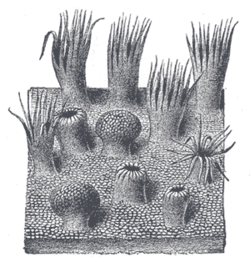Taste buds
| Taste buds | |
|---|---|

Semidiagrammatic view of a portion of the mucous membrane of the tongue. Two fungiform papillæ are shown. On some of the filiform papillæ the epithelial prolongations stand erect, in one they are spread out, and in three they are folded in.
|
|
| Details | |
| Identifiers | |
| Latin | caliculus gustatererius |
| MeSH | A03.556.500.885.779 |
| Code |
TH H3.04.01.0.02116 TH H3.04.01.0.03013 |
| TA | A15.4.00.002 |
| FMA | 54825 |
|
Anatomical terminology
[]
|
|
Taste buds contain the taste receptor cells, which are also known as gustatory cells. The taste receptors are located around the small structures known as papillae found on the upper surface of the tongue, soft palate, upper esophagus, the cheek and epiglottis. These structures are involved in detecting the five elements of taste perception: salty, sour, bitter, sweet and umami; through the combination of these elements we detect "flavors." A popular myth assigns these different tastes to different regions of the tongue; in reality these tastes can be detected by any area of the tongue. Via small openings in the tongue epithelium, called taste pores, parts of the food dissolved in saliva come into contact with the taste receptors. These are located on top of the taste receptor cells that constitute the taste buds. The taste receptor cells send information detected by clusters of various receptors and ion channels to the gustatory areas of the brain via the seventh, ninth and tenth cranial nerves.
On average, the human tongue has 2,000–8,000 taste buds.
The taste buds on the tongue sit on raised protrusions of the tongue surface called papillae. There are three types of lingual papillae that contain taste buds present on the human tongue:
The fourth type of papillae the filiform papillae are the most numerous but do not contain taste buds. They are characterized by increased keratinisation and are involved in the mechanical aspect of providing abrasion.
Salt, sweet, sour and umami tastes causes depolarization of the taste cells, although different mechanisms are applied.
...
Wikipedia
